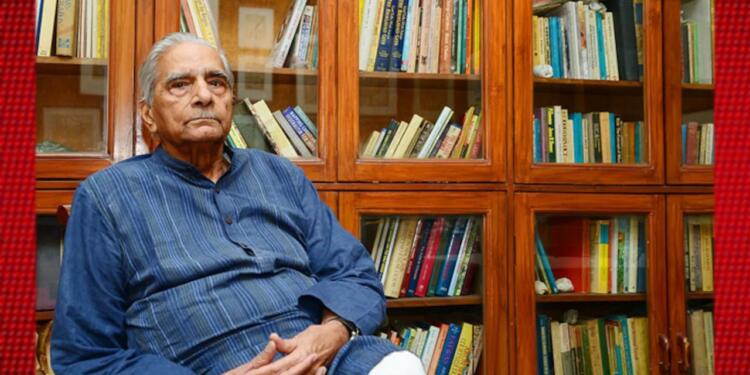A BSc graduate who chose to apply his analytical skills in the legal domain. A talented kid who didn’t go for cream and instead followed his passion. A lawyer who had rebuked the Attorney General of India. A lawyer who couldn’t become a judge because he was too young for it. A lawyer who was at the centre of the Emergency.
Initial life and tilt towards law
Shanti Bhushan was born in Bijnor district of Uttar Pradesh on November 11, 1925. His name is a tribute to the day of his birth. He was born on the day the end of the First World War was commemorated. His father, Vishwamitra, was a renowned lawyer of his time. When Shanti Bhushan was 18, his father and a few of his colleagues were hooked up to a CrPC provision. Shanti Bhushan got interested and followed the court proceedings thoroughly. While doing his BSc course, Shanti was simultaneously helping his father by curating civil drafts.
After graduation, his father wanted Shanti Bhushan to crack the civil service exam. Instead, Shanti enrolled for an LLB degree. Within no time, Shanti rose to fame in the legal profession.
Also read: SC/ST Act: A Controversial Reality
Tryst with the legal profession
There is no lawyer who has practised with and against him who can claim that Shanti Bhushan ever came ill-prepared in court proceedings. In the words of Dushyant Dave, former President of the Supreme Court Bar Association, “Every page of his brief would be read carefully and marked diligently.”
Bhushan’s reasoning used to be out of the box. Very few could channel their thoughts the way he could. To explain it, the man devised a technique that is handy for every genius facing the allegation of being a nerd. Shanti Bhushan used to diligently observe people’s daily lives and draw analogies from them to elaborate his points. No wonder, at the tender age of 37, he was offered a judgeship. He had accepted it.
But P.B. Gajendragadkar increased the lower age limit for High Court judges to 40. Bhushan was out of the race. Despite being re-offered after the age of 40, Shanti declined on principle.
Also read: Mandir independence movement: Constitution is both a facilitator as well as the roadblock
Emergency acted as shot in the arm
Shanti’s advocacy rose to national fame when he represented Raj Narain against Indira Gandhi in the Allahabad High Court. Indira Gandhi had to appear as a witness. Bhushan emerged victorious, and Gandhi’s election was set aside.
Adding insult to injury, she was disqualified from contesting elections for six years. When challenged in the Supreme Court, Bhushan had to contend with four judges who held opposing views on the doctrine of basic structure. Four judges wanted absolute control of Parliament on amending powers and were part of the minority judgement in the Kesavananda Bharati case.
Justice AN Ray, one of the judges, asked him a childlike question about the basic features. Bhushan responded, stating that amendment power doesn’t mean replacing the Constitution. On this issue, he had also castigated the Attorney General, saying, “His attitude towards this historic judgement is unworthy of the office he holds.” Ultimately, the 39th Constitutional Amendment was struck down. It became the first one to meet that fate.
Also read: Parachute Coconut oil is edible oil, just like Sachin Tendulkar is an actor
Professional and anti-incumbent throughout his life
Bhushan did not let his personal feelings cloud his responsibility. He had his differences with Y. V. Chandrachud. As law minister, Bhushan had the option of not recommending his elevation as Chief Justice. Even JP wanted it, but Bhushan did his due diligence on the basis of seniority. Later, he changed his senior-first approach in cases of unethicality and misconduct.
During his stint as law minister, he drafted the 44th Constitutional Amendment, which was brought in to undo the quirkiness of the 42nd Amendment. In 1986, Bhushan left the BJP after differences over an election petition. He later became one of the founding members of AAP.
Despite having so many political bones in his body, Bhushan’s main trademark was that of a legal practitioner. As one would expect, his stances would remain contrary to the establishment. He has defended people accused in the 1993 Mumbai Blast case, the 2001 Parliament attack case, Arundhati Roy, and Transparency International, among others. He is also one of the founders of the Center for Public Interest Litigation. Shanti Bhushan once even challenged the authority of the Chief Justice as Master of the Roster.
With so much anti-establishment sentiment, a contempt of court allegation is always on the horizon. Both Shanti and his son Prashant faced it. The manner in which both dealt with it is different. While Prashant paid a fine, Shanti Bhushan once said, “The question of apology does not arise.” “I am prepared to go to jail.”
Support TFI:
Support us to strengthen the ‘Right’ ideology of cultural nationalism by purchasing the best quality garments from TFI-STORE.COM
Also Watch:
https://www.youtube.com/watch?v=lZD48h9G5n8



























